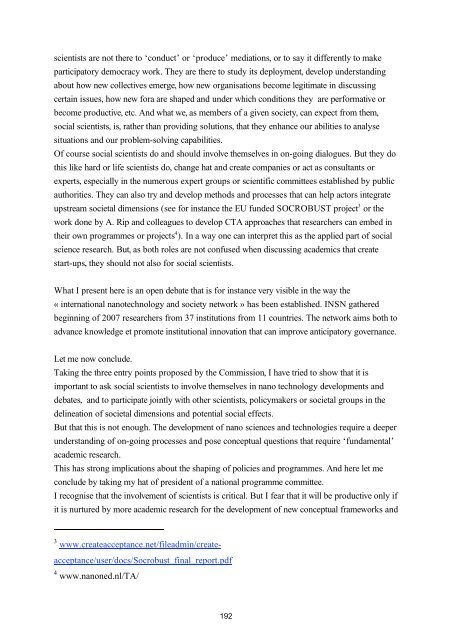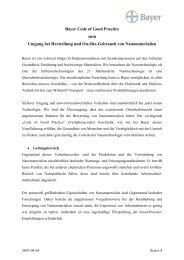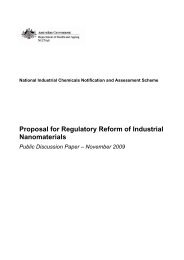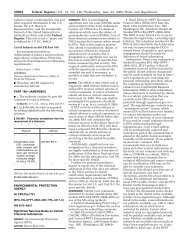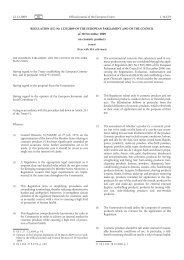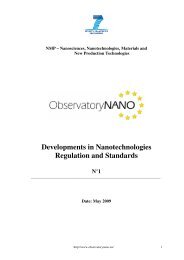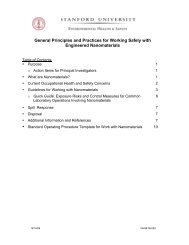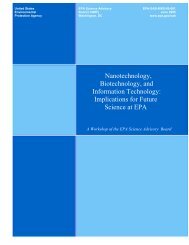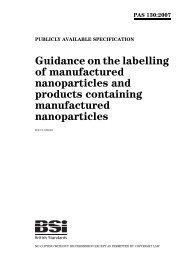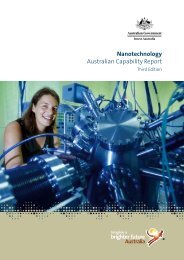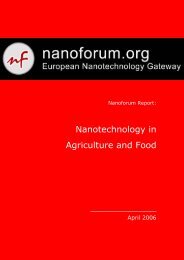Nanotechnology - Nanotech Regulatory Document Archive - Arizona ...
Nanotechnology - Nanotech Regulatory Document Archive - Arizona ...
Nanotechnology - Nanotech Regulatory Document Archive - Arizona ...
Create successful ePaper yourself
Turn your PDF publications into a flip-book with our unique Google optimized e-Paper software.
scientists are not there to ‘conduct’ or ‘produce’ mediations, or to say it differently to make<br />
participatory democracy work. They are there to study its deployment, develop understanding<br />
about how new collectives emerge, how new organisations become legitimate in discussing<br />
certain issues, how new fora are shaped and under which conditions they are performative or<br />
become productive, etc. And what we, as members of a given society, can expect from them,<br />
social scientists, is, rather than providing solutions, that they enhance our abilities to analyse<br />
situations and our problem-solving capabilities.<br />
Of course social scientists do and should involve themselves in on-going dialogues. But they do<br />
this like hard or life scientists do, change hat and create companies or act as consultants or<br />
experts, especially in the numerous expert groups or scientific committees established by public<br />
authorities. They can also try and develop methods and processes that can help actors integrate<br />
upstream societal dimensions (see for instance the EU funded SOCROBUST project 3 or the<br />
work done by A. Rip and colleagues to develop CTA approaches that researchers can embed in<br />
their own programmes or projects 4 ). In a way one can interpret this as the applied part of social<br />
science research. But, as both roles are not confused when discussing academics that create<br />
start-ups, they should not also for social scientists.<br />
What I present here is an open debate that is for instance very visible in the way the<br />
« international nanotechnology and society network » has been established. INSN gathered<br />
beginning of 2007 researchers from 37 institutions from 11 countries. The network aims both to<br />
advance knowledge et promote institutional innovation that can improve anticipatory governance.<br />
Let me now conclude.<br />
Taking the three entry points proposed by the Commission, I have tried to show that it is<br />
important to ask social scientists to involve themselves in nano technology developments and<br />
debates, and to participate jointly with other scientists, policymakers or societal groups in the<br />
delineation of societal dimensions and potential social effects.<br />
But that this is not enough. The development of nano sciences and technologies require a deeper<br />
understanding of on-going processes and pose conceptual questions that require ‘fundamental’<br />
academic research.<br />
This has strong implications about the shaping of policies and programmes. And here let me<br />
conclude by taking my hat of president of a national programme committee.<br />
I recognise that the involvement of scientists is critical. But I fear that it will be productive only if<br />
it is nurtured by more academic research for the development of new conceptual frameworks and<br />
3 www.createacceptance.net/fileadmin/create-<br />
acceptance/user/docs/Socrobust_final_report.pdf<br />
4 www.nanoned.nl/TA/<br />
192


